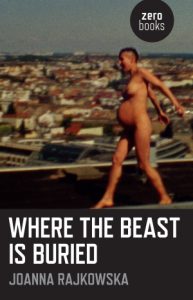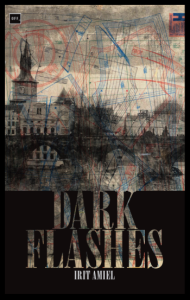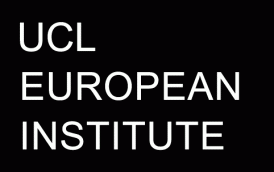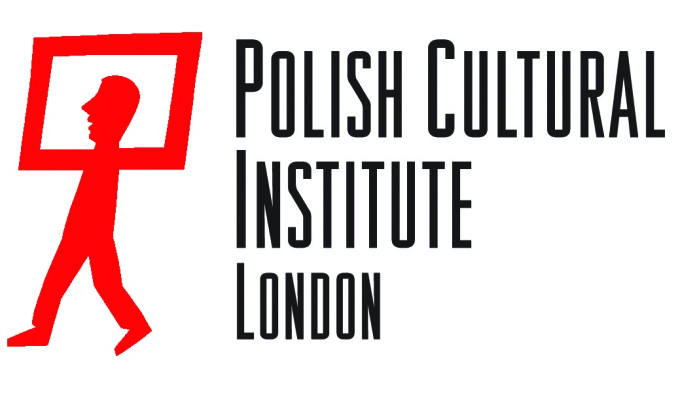15 January, 2014: Where the Beast is Buried (Joanna Rajkowska)
In Search of Public Space
Joanna Rajkowska in conversation with Maggie Humm, Martine Rouleau and Katarzyna Depta Garapich
discussion chaired by Kinga Stanczuk
Seminar and Book Launch

Venue:
4th floor Masaryk Senior Common Room
UCL School of Slavonic and East European Studies
16 Taviton Street, London WC1H 0BW
5-7 pm
Where the Beast is Buried, Joanna Rajkowska’s first English Language book, covering her artistic projects, gives the opportunity to talk about the role of art and public spaces in European contexts:
- Where is freely accessible public space?
- Is a public space in Eastern Europe different from that in UK?
- What can we do within it?
- How controlled is it and where are the limits of this control?
The following guests will take part In the discussion with Jonana Rajkowska
Maggie Humm (University of East London), Martine Rouleau (UCL)
and Katarzyna Depta-Garapich (Polish artist based in London).
Where the Beast is Buried
The first English-language book about Joanna Rajkowska and her unique practice of work in public spaces, within the contexts of diverse cultures and geographies.
Rajkowska’s unique artistic vision and methodology combines subjective narratives and critical discourses with a deeply felt concern for the spaces in which her works appear and the people they touch. Instead of simply invading or occupying public spaces, she blurs the identities and hidden tensions associated with them, navigating around communal dreams and fears. Historical trauma, cultural discourse, aesthetic relevance and geopolitical references all blend in her works in ways which both distress and heal, challenge and resolve, attack and absolve.
More information visit Zero Books website
Press release:
press_release_where_the_beast_is_buried
A food and wine reception will follow the discussion. All are welcome.
20 November, 2013: EU Migration in Polish and Central European Cinema
TRANSGRESSIVE IDENTITY and EU Migration in Polish and Central European Cinema
A lecture by
Professor Małgorzata Radkiewicz (Jagiellonian University, Poland)
Venue:
4th floor Masaryk Senior Common Room
UCL School of Slavonic and East European Studies
16 Taviton Street, London WC1H 0BW
Registration:
About the event:
Visual material: feature films and documents – Polish and Central European.
Key words: identity, culture, gender, globalisation, nomadism, post-modernism, post-communism, colonial/ postcolonial studies.
There are in fact only several films in Poland and other countries that address the issue of “EUmigration”, which is the term I created to discuss both: migration/ emigration and the social dynamic of The European Union. After joining the EU in 2004, Poland became part of a new socio-political, cultural and economical structure. For hundred thousands of people (of different age, class, gender, education and backgrounds) it was a promising moment to start “a new life”. The process of massive migration started and it has been continuing permanently.
One can analyze the complexity of the process form many different perspectives, including social, cultural one. In my lecture I decided to focus on the category of identity, which I call “transgressive identity”, following concepts of Zygmunt Bauman, Rossi Braidotti and Stuart Hall. I would like to analyze selected visual materials that illustrate the process of EUmigration and its consequences, and then to interpret particular narrations and images using theoretical texts, that try to define particular ideas (of postmodernism, nomadic identity, etc.), using such terms as: transgression, globalisation, multi- and intercultural societies, post-colonialism, post-communism, feminism, queer and others. However, the crucial category for me is transgressive identity and its representations in contemporary cinema, which can be examined in terms of gender, nationality, race, ethnicity and others.
Considering the complex issue of identity, it is important to see it as a dynamic process of creativity that is based on:
– diversity and differentiation,
– variations and dissimilarities
-and, as Rosi Braidotti argues, “intensive and often intransitive transitions”.
Malgorzata Radkiewicz, PhD, is an Assistant Professor at the Institute of Audio Visual Arts at the University of Krakow. Her research interests and publications focus on gender representation in film and media as well as on much wider category of cultural identity She published a book about women filmmakers, and other on Polish cinema of 1990s. In her last book: “Female Gaze: Film Theory and Practice of Women directors and artists” she addresses the issue of women’s cinema and arts in terms of feminist theory.
7 November, 2013: Irit Amiel with prof. Joanna Michlic
“Remembering, re-writing, re-telling… The poetry of Irit Amiel”
November 7, at 5 pm, SSEES
A discussion covering contemporary Jewish poetry and the notion of displacement, celebrating the publication of Dark Flashes, the latest collection of Irit Amiel’s poetry to be published in English translation (OFF_PRESS, UK).
Programme:
Introduction ‘Mapping Childhood: The Generation of Irit Amiel ‘ by a specialist in Polish-Jewish relations.
Short reviews/opinion by the editor of the book and the poet and the literary scholar and translator dr Ursula Phillips.
Venue:
4th floor Masaryk Senior common Room
UCL School of Slavonic and East European Studies
16 Taviton Street, London WC1H 0BW

20 June 2013: Maria Jastrzebska and Marek Kazmierski with SJ Fowler
Being Elsewhere – Migrating Stories
Maria Jastrzębska and Marek Kazmierski in dialogue with SJ Fowler
(eML poster 20 JUNE 2013)
Thursday, 20 June 2013, 5-7 pm
Room 432, 4th floor
Reception afterwards in Masaryk Senior Common Room,
UCL School of Slavonic and East European Studies
16 Taviton Street, London WC1H 0BW
Registration: https://emigratinglandscapes.org/registration/
For further details please contact dr Urszula Chowaniec: u.chowaniec@ucl.ac.uk
The event will focus on Maria’s latest collection of poems At The Library of Memories (Waterloo Press 2013).
It will also feature the official launch of Marek’s new book Damn the Source (OFF_PRESS, 2013)
13 May, 2013: Wioletta Grzegorzewska and Genowefa Jakubowska-Fijalkowska
Wioletta Grzegorzewska
and
Genowefa Jakubowska-Fijałkowska
Interview
at the Borders of Language
(Poetical Debate on Language led by Sophie Mayer)
Monday 13 May 2013, 5-7 pm.
Room 431
Reception: Room Senior Common Room, 4th floor
UCL School of Slavonic and East European Studies
16 Taviton Street, London WC1H 0BW
Registration: https://emigratinglandscapes.org/registration/
For further details please contact dr. Urszula Chowaniec: u.chowaniec@ucl.ac.uk
Poster: Seminar 3_Wioletta Grzegorzewska and Genowefa Jakubowska Fiałkowska
Blog Wioletty (in Polish)
Articles on Genowefa (in Polish) Literackie pl., Literatura jest sexy
Sophie’s blog here
Blog Marek Kazmierski, translator of Wioletta and Genowefa here
Soon on our website:
- Selected poems by the authors,
- The detailed programme of the meeting on May 13th
- Questionnaire for everybody who would like to ask questions in advance (all questions will be answered either during the meeting or later on the website!)
20 March, 2013: AM Bakalar and Grażyna Plebanek
UCL School of Slavonic and East European Studies / eMigrating Landcapes Project
invites you for a debate on:
The new ideas about borders and “New Europeans?” in contemporary literary landscapes. Meeting with two authors:
AM Bakalar and Grażyna Plebanek
Commentary and discussion afterword will be led by Tim Beasley-Murray and Agata Pyzik.
Wednesday 20 March 2013, 5-7 pm
Room 433, with the reception afterwards in the Senior Common Room
UCL School of Slavonic and East European Studies
16 Taviton Street, London WC1H 0BW
direct streaming available at
http://www.ucl.ac.uk/live/emigration-2
.
For further details please contact: u.chowaniec@ucl.ac.uk
.
A.M. Bakalar was born and raised in Poland. She lived in Germany, France, Sicily and Canada before she moved to the UK in 2004. Madame Mephisto is her first novel and was among readers recommendations to the Guardian First Book Award. She is the first Polish woman to publish a novel in English since Poland joined EU in 2004. A.M. Bakalar lives with her partner, a drum and bass musician, in London. She is currently at work on her second novel.
Grażyna Plebanek is a writer, author of best-selling novels “Illegal Liaisons” (Stork Press 2012), named “Best of 2012″ by These Little Words. She also wrote “Girls from Portofino” (WAB 2005) as well as “Box of Stilettos” (2002, WAB 2006) and “A Girl Called Przystupa”. She is the author of short stories published in the following anthologies: “Dziewczynskie bajki na dobranoc” (Girls’ good-night stories, AMEA 2008), “Zaraz wracam” (Back shortly, Centrum Kultury Zamek, 2008), “Projekt mezczyzna (Project Man, wydawnictwo Delikatesy, 2009), “Piatek, 2:45″ (Friday, 2:45, Filar 2010), “Whims” (Swiat Ksiazki 2012). Born in Warsaw, Plebanek has lived for five years in Stockholm and she now resides in Brussels. She is among a group of international artists whose portraits will be exhibited in Brussels Gare del’Ouest for the next 10 years.
13 March, 2013: Irit Rogoff and Joanna Rajkowska
The Introduction to the Seminar (March 13, 2013)
Seminar 1_ Irit Rogoff and Joanna Rajkowska
Event 1:
UCL School of Slavonic and East European Studies / eMigrating Landcapes Project
invites you for a lecture
Exhausted Geographies
by
Irit Rogoff
Discussion afterword will be held by Joanna Rajkowska
Wednesday 13 March 2013, 5-7 pm.
Room Senior Common Room, 4th floor
UCL School of Slavonic and East European Studies
16 Taviton Street, London WC1H 0BW
For further details please contact: u.chowaniec@ucl.ac.uk
About the lecture:
Like the structure of language that relies on negative differentiation so does cartography rely of division and navigation. Derrida’s statement that “Boundaries, whether narrow or expanded are nothing more that the limits of the possible” exemplifies this perception of national geographies.
Geography is knowledge – who we are, where we are – what our heritages and allegiances are – has always been linked to geography. The proposed concept of ‘exhausted geographies’ is a concept that is trying to work against the grain of both the boundaries of the possible and of location as the site of identity and knowledge.
Irit Rogoff is a writer, curator, and organizer working at the intersection of contemporary art, critical theory, and emergent political manifestations. She is Professor of Visual Cultures at Goldsmiths, London University where she heads the PhD in Curatorial/Knowledge program and the MA in Global Arts program. Rogoff has written extensively on geography, globalization, and contemporary participatory practices in the expanded field of art. A collection of recent essays, Unbounded—Limits’ Possibilities, is published in 2012 with e-flux journal/ Sternberg and her new book, Looking Away—Participating Singularities, Ontological Communities, comes out in 2013. Rogoff lives and works in London.




Recent Comments